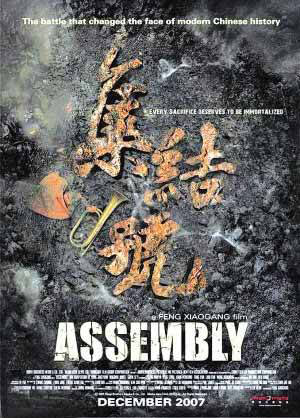
THE ASSEMBLY
China, 2007, 124 minutes, Colour.
Zhang Hanyu, Deng Chau, Yuan Wenkang, Tang Yan, Liao Fan.
Directed by Feng Xiao Gang.
Feng Ziaogang has made some impressive films in recent years, broad comedy in Big Shot’s Funeral, the story of remote areas of China in World Without Thieves and a sumptuous historical variation on the Hamlet story, The Banquet. This time he has taken on 20th century Chinese history, particularly the civil war of 1948-49 which led to the formation of the People’s Republic of China and the emergence of Mao Tse Tung.
The first half of the film is a re-creation of battles. This is film-making in the Saving Private Ryan vein but goes beyond Spielberg, almost an hour of intense close-up fighting, ebbs and flows between the two sides, traps and snipers, explosions and the horrible injuries and deaths and loss of friends that war brings. The point of view is not so much antiwar as presenting the realities in as graphically real way possible.
The film changes tone half way through. Politics and war have been settled in China but the Korean war is being waged. When it ends, China moves into a reconstruction period in the mid-1950s.
The film focuses on Guzidi, an officer who had made a hard decision in the civil war. Some of his men said that they had heard the Assembly call for a retreat. Guzidi did not hear it and the squad stayed and were destroyed. Because Guzidi had been wounded and taken to hospital, the squad was deemed as simply disappearing in war. Guzidi now decides that he must find the bodies of his men and rehabilitate their reputation.
His quest takes him back to the scene of battle, now looking beautiful in comparison with how we have seen it in the horror of battle. However, the coal mine on the site is being closed and there seems to be no way of finding the men’s bodies. With the help of authorities and the widow of his intelligence office, he perseveres.
This makes the film a tribute to the men and all those who died in the wars of the past.
The film is certainly worth seeing for the war sequences despite their being so vividly gruelling. It is worth seeing for gauging a 21st century view on the revolutionary past.
1.The impact of the film? For Chinese audiences? For Taiwanese audiences and the background of the nationalist army? For audiences outside China?
2.The perspective on 1948, from sixty years afterwards? The memories of Mao, the communist revolution, the nationalist resistance? Looking again at the images, the characters, the issues? From a communist perspective?
3.The location photography, the 1948 settings, the town and the battles? The contrast with 1951, North Korea, the war in Korea? The 1955 sequences, the hill, the coalmine, the excavations? The bodies? The personal stories? The rehabilitation of the men? The musical score?
4.The title, the bugle call for retreat? The dying soldier hearing it? Gu and his not hearing it, his deafness? The information in 1955 that the bugle call was not sounded? Their being asked to hold the line until the bugle sounded? The irony that they were to be sacrificed and the sound not given? The fact that Gu actually led the group to their ultimate deaths?
5.The first hour, the vivid picture of warfare, the graphic detail, the focus on individuals and their skills, the dangers? The enemy? The town, the bombardments, the explosions? Immersing the audience in this experience of war for an hour? The effect of Gu, shooting the prisoner of war, the reactions of the authorities? His imprisonment? His next mission, his choosing the schoolteacher as his political officer? Going to the front, the vivid presentation of the front, the No Man’s Land, interactions with the enemy, the disguises? The holding of the line? The death of the teacher? The other deaths? Gu and his being injured? Found? His being taken to hospital, the difficulty of his identity, the disappearance of his men?
6.North Korea, 1951, the scenes of battle? Gu and the encounter with the officer, saving his life? His own injuries, in hospital?
7.1955, Gu and his continued quest? His development as a character, his sense of his own worth, trying to prove the existence of his group? Scouring the countryside, returning to the scene? The contrast of 1955 and the mountain with the bleakness of 1948? His friendship with the officer he saved? His meeting the widow of the teacher? Their discussions, going on a quest? Trying to find the men, their bodies, to rehabilitate them and honour them? His help from the officer? Persuading him to marry the widow? The documentation, the lack of documentation, the nature of the mine? The coal, the fields? Permission to excavate, going through the coal, finding the entrance, finding the cave, finding the bodies?
8.The funeral, the tribute?
9.Gu, his mission accomplished? Sense of his own worth and dignity?
10.The fact that this was based on a true story? Gu and his death in 1987 at the age of seventy-one?
11.The fact that China produced such a film, with such perspectives, its view on the revolution, on the wars, the treatment of the soldiers, the individual versus society? The role of leadership? Honouring the dead?